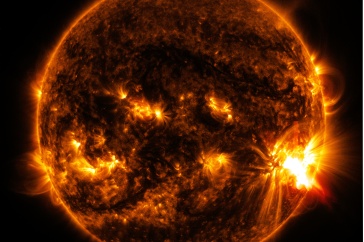
The total solar eclipse of 2024 will be more than just a fascinating visual phenomenon — it will provide the opportunity for students across the U.S., including a team of physics students from UNH, to help gather vital data about the sun’s atmosphere.
The UNH team is led by Brianna Isola, a Ph.D. student who studies the Earth’s magnetosphere. Isola and five other Ph.D. students will travel to Pittsburg, New Hampshire, which lies within the path of totality, bringing with them a telescope fitted with a solar filter and recording equipment provided as part of the Citizen Continental-American Telescope Eclipse (Citizen CATE) 2024 project.?The UNH team is one of 35 teams selected to participate in this unique data-driven event.

During the approximately three-minute-long total eclipse, the sun’s corona, or outer atmosphere, will be revealed, which will appear as plumes and loops emanating from the sun.?The teams will take high-resolution polarized measurements using the telescope?while also recording video footage that will later be combined with the videos recorded by Citizen CATE student teams in other parts of the country. These images will focus on the polarization, or angle, of the sun’s corona, and will help space scientists learn more about the electron density and strength of the solar wind, as well as magnetic reconnection — when magnetic energy is converted into heat.
The other UNH students involved in the participatory science project include Raman Mukundan, Alvin Angeles, Hanieh Karimi, Neha Srivastava, and Tyler Metivier, all of whom are pursuing their Ph.D. degrees in physics. After the project concludes, the telescope equipment will be publicly accessible through the UNH Observatory.
“I’m excited to participate in this project because it’s a rare natural phenomenon related to my studies in solar magnetospheric science,” Isola says. “It’s a life-changing event, and I get to be involved in something larger than my own research, something that provides hands-on experience.”
The?UNH Institute for the Study of Earth, Oceans, and Space (EOS)?is UNH's largest research enterprise, comprising six centers with a focus on interdisciplinary, high-impact research on Earth and climate systems, space science, the marine environment, seafloor mapping and environmental acoustics. With approximately 100 principal investigators managing more than 400 individual grant awards, and with annual expenditures exceeding $95?million, EOS fosters an intellectual and scientific environment that advances visionary scholarship and leadership in world-class and graduate education.??
-
Written By:
Rebecca Irelan | Institute for the Study of Earth, Oceans, and Space | rebecca.irelan@unh.edu | 603-862-0990



















































